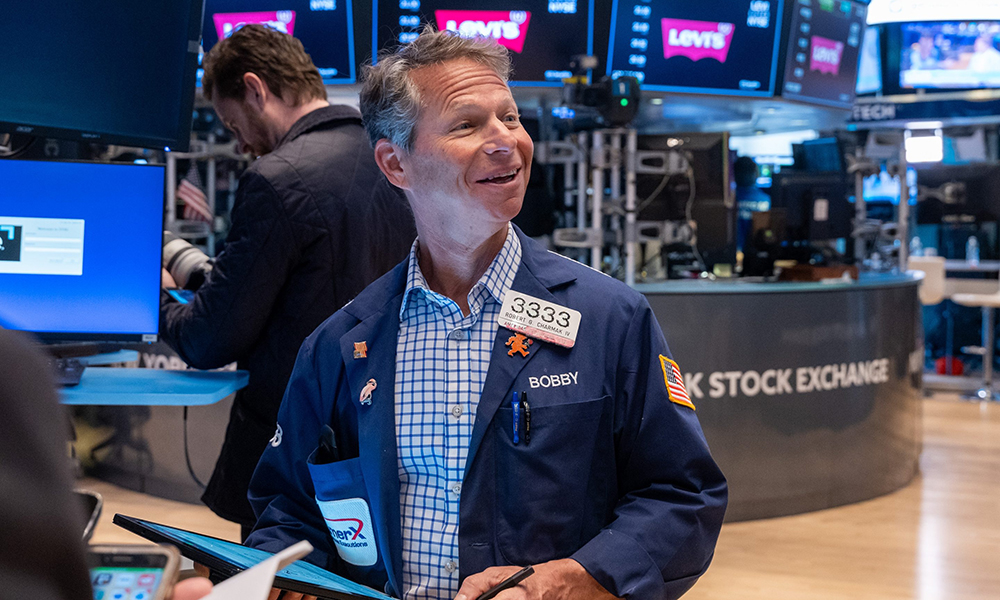
随着中东地区以色列和伊朗的冲突升级,而且事实证明美国国内的通胀比预想的更难控制,至少到目前为止,美国股市终于停止了大幅上涨。从去年10月底到今年3月28日,标普500指数暴涨超过27%,但在过去两周半已经下跌了约4%。
但投资管理与市场研究公司Main Street Research的创始人兼首席投资官詹姆斯·德默特认为,这只是牛市的临时盘整,在未来十年仍会给投资者带来回报。Main Street Research管理的资产规模高达20亿美元。
德默特在金融行业从业35年,曾出版过三本投资类图书,包括最近出版的《华尔街经验》(Wall Street Lessons)。他解释称,他认为美股连续近六个月上涨之后,“肯定会出现回调”,但这并不会改变他的长期观点,即在未来几年,人工智能会推动收益增长。
他通过电子邮件告诉《财富》杂志:“虽然目前媒体报道的都是可怕的新闻,但我们认为我们已经进入了在人工智能驱动下的新牛市,因此对于本次股市回调,我们持买入态度。新牛市可能再持续七至九年,因为人工智能预计将大幅提升各行各业的生产力,这将增加企业收益。”
人工智能驱动收益增长,直面地缘政治风险
关于人工智能繁荣,大多数专业投资者从最开始就在考虑一个主要问题:近期人工智能的热度是过度炒作还是合理现象?辩论双方阵营依旧有一些主流的声音。
德默特认为,未来几年,人工智能的崛起将帮助推动公司收益增长,投资者不应该因为近期的地缘政治风险问题而错过良机。他认为:“在这个令人激动的由人工智能驱动的新商业周期,投资者必须避免冲动和对中东冲突等事件作出过激反应,而是要制定耐心的、反应积极的和机会主义的策略,以应对这些事件。”
一些统计数据证明人工智能具有削减成本和提高生产力的能力,德默特认为这会增加公司的收益。高盛(Goldman Sachs)的研究显示,未来十年,人工智能可使全球GDP增长7万亿美元。麦肯锡(McKinsey)发现,生成式人工智能系统将使目前占用上班族70%的时间的任务,完全自动化。
从美国金融业巨头到拉丁美洲电信公司,全世界的公司都在利用人工智能降低人工成本,提高生产力,尤其是在客户服务和市场营销方面。不只是大公司在努力抓住人工智能繁荣所带来的机遇。以Batesville Tool & Die公司为例。该公司是来自印第安纳州贝茨维尔的一家小型制造公司,主要生产精密金属冲压部件。据美联社今年早些时候的报道,由于Batesville Tool & Die地处一个小城镇,因此多年来一直无法吸引人才,使公司出现了严重的问题。于是,公司管理层决定投资可使用人工智能“看到”周围的世界和模仿人类员工的机器人,不仅解决了人手不足的问题,还提高了公司的生产力。
德默特和其他看好人工智能的投资者认为,同样的事情正在世界各地上演,而且这些创新在未来几年将提高公司的收益。但这位资深投资者依旧警告,短期内股市可能经历阵痛,尤其是如果中东局势升级,“该地区的其他势力”卷入其中。他说道:“股市回调的量级很大程度上取决于中东局势和未来走向。” 他警告“当前的紧张局势一旦升级,就会导致股市进一步下跌”。
Bowersock Capital Partners公司CEO兼创始合伙人艾米莉·鲍尔索克·希尔本周也通过电子邮件对《财富》杂志表示“地缘政治风险异常升高,而且风险可能持续存在”。这意味着,投资者应该保持警惕。尽管面临中东战争的威胁,还有更高的通胀和更少的降息次数,但她也相信牛市“不会受到影响”。而且对于希望抓住人工智能繁荣的投资者,Bowersock Hill提供了许多想法。
她说道:“我们看好那些将从人工智能中受益,但股价尚未体现出相关长期生产力增益的行业,包括医疗保健和工业等。我们还看好科技行业内能够拓展或支持人工智能应用的与人工智能关系密切的公司。”(财富中文网)
翻译:刘进龙
审校:汪皓
随着中东地区以色列和伊朗的冲突升级,而且事实证明美国国内的通胀比预想的更难控制,至少到目前为止,美国股市终于停止了大幅上涨。从去年10月底到今年3月28日,标普500指数暴涨超过27%,但在过去两周半已经下跌了约4%。
但投资管理与市场研究公司Main Street Research的创始人兼首席投资官詹姆斯·德默特认为,这只是牛市的临时盘整,在未来十年仍会给投资者带来回报。Main Street Research管理的资产规模高达20亿美元。
德默特在金融行业从业35年,曾出版过三本投资类图书,包括最近出版的《华尔街经验》(Wall Street Lessons)。他解释称,他认为美股连续近六个月上涨之后,“肯定会出现回调”,但这并不会改变他的长期观点,即在未来几年,人工智能会推动收益增长。
他通过电子邮件告诉《财富》杂志:“虽然目前媒体报道的都是可怕的新闻,但我们认为我们已经进入了在人工智能驱动下的新牛市,因此对于本次股市回调,我们持买入态度。新牛市可能再持续七至九年,因为人工智能预计将大幅提升各行各业的生产力,这将增加企业收益。”
人工智能驱动收益增长,直面地缘政治风险
关于人工智能繁荣,大多数专业投资者从最开始就在考虑一个主要问题:近期人工智能的热度是过度炒作还是合理现象?辩论双方阵营依旧有一些主流的声音。
德默特认为,未来几年,人工智能的崛起将帮助推动公司收益增长,投资者不应该因为近期的地缘政治风险问题而错过良机。他认为:“在这个令人激动的由人工智能驱动的新商业周期,投资者必须避免冲动和对中东冲突等事件作出过激反应,而是要制定耐心的、反应积极的和机会主义的策略,以应对这些事件。”
一些统计数据证明人工智能具有削减成本和提高生产力的能力,德默特认为这会增加公司的收益。高盛(Goldman Sachs)的研究显示,未来十年,人工智能可使全球GDP增长7万亿美元。麦肯锡(McKinsey)发现,生成式人工智能系统将使目前占用上班族70%的时间的任务,完全自动化。
从美国金融业巨头到拉丁美洲电信公司,全世界的公司都在利用人工智能降低人工成本,提高生产力,尤其是在客户服务和市场营销方面。不只是大公司在努力抓住人工智能繁荣所带来的机遇。以Batesville Tool & Die公司为例。该公司是来自印第安纳州贝茨维尔的一家小型制造公司,主要生产精密金属冲压部件。据美联社今年早些时候的报道,由于Batesville Tool & Die地处一个小城镇,因此多年来一直无法吸引人才,使公司出现了严重的问题。于是,公司管理层决定投资可使用人工智能“看到”周围的世界和模仿人类员工的机器人,不仅解决了人手不足的问题,还提高了公司的生产力。
德默特和其他看好人工智能的投资者认为,同样的事情正在世界各地上演,而且这些创新在未来几年将提高公司的收益。但这位资深投资者依旧警告,短期内股市可能经历阵痛,尤其是如果中东局势升级,“该地区的其他势力”卷入其中。他说道:“股市回调的量级很大程度上取决于中东局势和未来走向。” 他警告“当前的紧张局势一旦升级,就会导致股市进一步下跌”。
Bowersock Capital Partners公司CEO兼创始合伙人艾米莉·鲍尔索克·希尔本周也通过电子邮件对《财富》杂志表示“地缘政治风险异常升高,而且风险可能持续存在”。这意味着,投资者应该保持警惕。尽管面临中东战争的威胁,还有更高的通胀和更少的降息次数,但她也相信牛市“不会受到影响”。而且对于希望抓住人工智能繁荣的投资者,Bowersock Hill提供了许多想法。
她说道:“我们看好那些将从人工智能中受益,但股价尚未体现出相关长期生产力增益的行业,包括医疗保健和工业等。我们还看好科技行业内能够拓展或支持人工智能应用的与人工智能关系密切的公司。”(财富中文网)
翻译:刘进龙
审校:汪皓
With the conflict between Israel and Iran escalating in the Middle East, and inflation proving more difficult to tame than expected domestically, the stock market’s meteoric rise has finally been halted—at least for now. After surging more than 27% between the end of last October and March 28, the S&P 500 has dropped roughly 4% over the past two and a half weeks.
But this is just a temporary correction in a bull market that’s set to reward investors for nearly a decade, argues James Demmert, founder and chief investment officer of Main Street Research, an investment management and market research firm with $2 billion in assets under management.
Demmert, who has spent 35 years in the financial industry and authored three books on investing, including his most recent Wall Street Lessons, explained that he believes stocks were “due for a pullback” after rising in nearly a straight line for six months, but that doesn’t change his long-term thesis that AI will drive earnings growth for years to come.
“We are buyers of this stock market correction because while the headlines are scary right now, we believe we have entered a new bull market led by the power of artificial intelligence,” he told Fortune via email. “This new bull market can last for another seven to nine years, as AI is expected to drive significant productivity gains for companies across the board, which will strengthen corporate earnings.”
An AI-driven earnings boom—with geopolitical risks
When it comes to the AI boom, the main question for most professional investors has been clear from the start: Is the near-term hype overly enthusiastic, or is it warranted? And there are still leading voices on both sides of that debate.
Still, for Demmert, the rise of AI will help drive corporate earnings in the coming years—and investors shouldn’t miss out due to near-term geopolitical issues. “During this exciting new business cycle that will be driven by artificial intelligence, investors must avoid being impulsive and reactive to events such as the Mideast conflict and instead institute a strategy that is patient, responsive, and opportunistic as these types of events unfold,” he argued.
There are some statistics that back up the cost-cutting and productivity-enhancing abilities of AI that Demmert believes will lift corporate earnings. AI could increase global GDP by $7 trillion over the next decade, according to a study from Goldman Sachs. And McKinsey found that generative AI systems could eventually automate tasks that currently take up 70% of workers’ time on the job.
From U.S. financial giants to Latin American telecoms, companies worldwide are already using AI to reduce labor costs and improve productivity, particularly when it comes to customer service and marketing. But it’s not just major corporations that are taking advantage of the AI boom. Take the example of Batesville Tool & Die, a small manufacturing company in Batesville, Ind., that makes precision metal stamping components. As the Associated Press reported earlier this year, Batesville Tool & Die struggled to attract talent to its small town for years, leading to serious issues for the company. Then management decided to invest in a robot that used AI to “see” the world and mimic human workers, which ended the talent crunch and increased the company’s productivity.
Demmert and other AI bulls believe stories like this are happening all over the world, and those innovations will serve to boost corporate earnings for years to come. Still, the veteran investor warned that stocks may be in for some pain in the near term, particularly if tensions in the Middle East cascade and “other players in the region” get involved. “The magnitude of this stock market correction will depend in large part on what’s going on in the Middle East and how things play out from here,” he said, warning that “any escalation of the current tensions would likely cause a further drop in stocks.”
Emily Bowersock Hill, CEO and founding partner of Bowersock Capital Partners, also told Fortune via email this week that “geopolitical risks are unusually elevated and are likely to remain so.” Meaning: Investors should be cautious. But despite the threat of war in the Middle East—as well as higher inflation and fewer rate cuts—she, too, believes the bull market “remains intact.” And Bowersock Hill has a few ideas for investors looking to take advantage of the AI boom as well.
“We like sectors that will benefit from AI but have yet to price in the associated long-term productivity gains, including health care and industrials,” she said. “We also like AI-adjacent names within the technology sector that magnify or enable AI’s use.”






